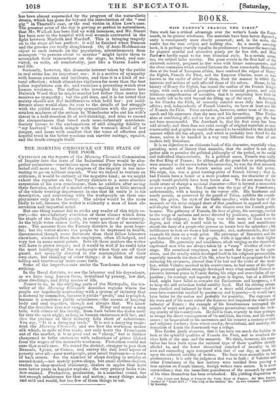THE MORNING CHRONICLE ON THE STATE OF THE POOR.
CRITICISM on the reports of the Morning Chronicle Commission of Inquiry into the state of the Industrial Poor would be alto- gether premature—conclusions upon the scanty data already. col- lected still more so; but the progress of the inquiry is too Inte- resting to go on without remark. Were we indeed to venture on criticism, it would be entirely of the negative kind ; as we might exhort the reporter on the Factory districts to a more absolute suspension of his own conclusions, than he exhibits after seeing three factories, rather of a model order,—making so little account of the whole weaving department in one that he omits it in his description, and conversing with the workpeople on their em- ployments only in the factory. The advice would be the more likely to tell, because the writer is evidently a man of keen ob- servation and impartial mind.
But one thing cannot fail to strike any reader of this triple re- port,—the unsatisfactory condition of those classes which form the staple of the English people, in every quarter of the country. As the triple voice comes forth, its tones are those of mournful- ness. The account from the Factory districts is the most hope- ful; but the writer shows the people to be depressed in health, discontented though more fortunate than their fellow labourers elsewhere, alienated from their employers, often ill-lodged, and very low in some moral points. Into all these matters the writer will have to pierce deeper ; and it would be well if he could take the most intelligent of the workpeople when they are off their guard, not specially directed to the contemplation of their -own state, but thinking of other things : it is then that many telling and trustworthy traits come forth. Some of the improvements under the Ten-hours Act are very striking. In the Rural districts, we see the labourer and his dependents, as we have long known them, brutalized by penury, low diet, close dwellings, and filthy modes of life. Nearer to us, in the outlying parts of the Metropolis, the tra- veller of the .3forning Chronicle describes regions where the people are hopelessly contending with a system of industry that is fostered by commerce, because it yields "profit," and is peopled, because it sometimes yields subsistence—the means of keeping body and soul together, though not always that. We know that the describer does not exaggerate. Many and many a man toils, with others of his family, from dark before the dawn until far into the next night, as long as human endurance will last, and then the produce of their industry falls short of subsistence. g You say, It is a decayin trade. It is not a decaying trade: read the Morning Chronicfe, and see how the workman makes silk which, in spite of free trade net only beats the Frenchman out of the market, it is so good and so "cheap," but is further cheapened to bribe customers with reductions of prices filched from the wages of the miserable workman. Protection would not cure that man's case. Go round the district, stranger to you than Brussels, Lyons, or Genoa, and survey the dull level aspect of poverty over all—poor workpeople, poor small tradesmen—a town of back streets. See the number of shops dealing in articles at second-hand,—not merely pawn-shops, but small clothes-dealers, traders in shop-marked stationery, dealers in apples that have seen better years in happier regions ; the very grocery looks win- dow-stained. Production, production, in a ceaseless round, but not enough subsistence for that sad nation ; many things made and sold and resold, but too few of them things to eat.


























 Previous page
Previous page